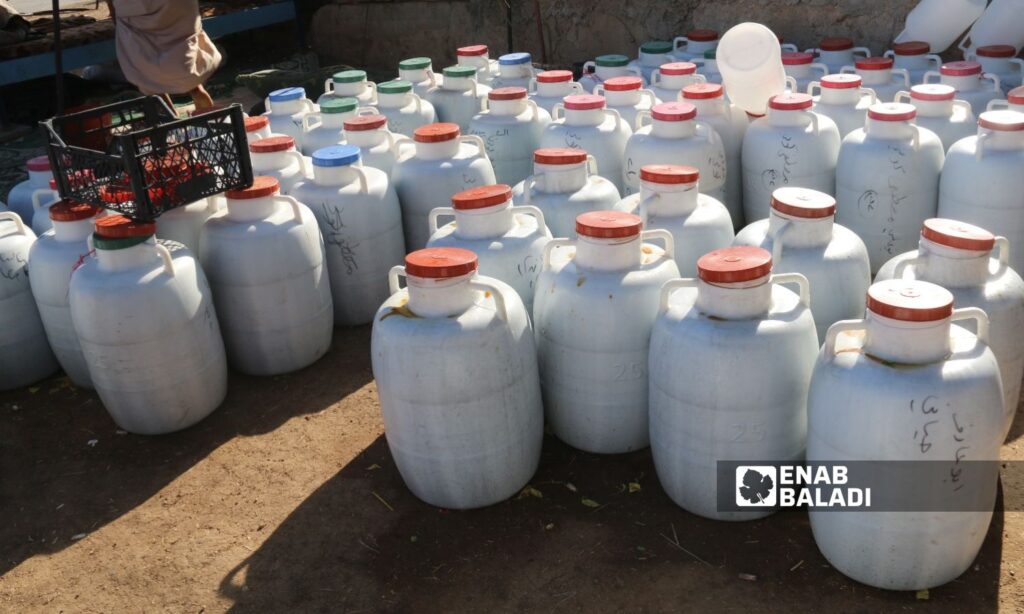A report prepared by Enab Baladi about the method of making grape molasses in the village of Doudyan, northern Aleppo, has sparked many criticisms regarding the lack of hygiene standards during the grape pressing process.
The criticism is not limited to grape molasses production but includes many other manual and traditional crafts such as pomegranate molasses, tomato paste, and others.
It is believed that traditional production methods have maintained the quality and flavor of the product, but this belief is met with criticism about the health risks that manual methods may pose.
This is due to the workers’ failure to adhere to the required hygiene standards, which could potentially cause diseases for consumers.
High heat contributes to sterilization
Dawood Mohammed Ali, the owner of a pressing facility in the village of Doudyan, told Enab Baladi that the methods used are the only way to obtain grape molasses.
He added that the process of turning grapes into molasses starts with thoroughly washing them to remove dirt and impurities, then filtering them using a substance called “Nahata,” which helps in precipitating heavy dirt and impurities.
After that, the grapes are pressed and filtered through special pipes, directing the juice into large containers for the final stage.
Mohammed Ali pointed out that the final stage in production requires the juice to be boiled at very high temperatures for three to four consecutive hours.
He believes that this high heat plays a crucial role in sterilizing and purifying the molasses from any impurities or germs that might be present, ensuring that the final product is free from health risks.
Expertise without modern machines
In addition to grape molasses production, the pomegranate molasses industry also relies on traditional manual methods, and its producers face challenges and criticism due to the absence of modern technology, forcing them to rely on manual skills.
In this context, Mahmoud Khalil, who works in pomegranate molasses production in the village of Basouta in rural Aleppo, explained to Enab Baladi that the manual method of producing pomegranate molasses is the only available method due to the lack of dedicated or modern machines for this industry.
He added that the traditional preparation process relies on inherited expertise and precision in every step, starting from selecting the pomegranates to slowly cooking them over a fire.
Khalil indicated that the process of cooking the molasses might last for six continuous hours, enabling him to produce natural molasses completely free from preservatives or industrial additives that cause health damage.
The grape pressing process in the countryside of Aleppo goes through the stages of washing, pressing, and then boiling – September 2024 (Enab Baladi/Dayan Junpaz)
Boiling the product is not enough
General practitioner Adam Abu Khars told Enab Baladi that germs might remain in the molasses despite boiling it at high temperatures due to exposure to unsafe environmental factors.
The doctor added that germs could come from various sources such as soil and surrounding dust in open areas, and the boiling process alone is not sufficient to fully sterilize the product if it is not done in a safe and sterile environment.
He also pointed out the possibility of multiple types of viruses or bacteria, in addition to microorganisms like worms, noting that the spread of these contaminants varies from one area to another depending on the environmental conditions surrounding the manufacturing process.
Different opinions
Mohammed Jamal from rural Aleppo told Enab Baladi that watching the method of making pomegranate molasses on social media led him to completely refrain from this product, attributing the reason to the accumulated dirt on the tools used in the process.
He added that he does not want to expose his children to any health risks that might result from consuming these products, considering them non-compliant with the required health standards.
Zuhair Darwish, a resident of Azaz, told Enab Baladi that he prefers buying factory-produced products over those made by hand, attributing this to the lack of effective oversight on these manual workshops.
He added that automated manufacturing provides a better guarantee of sterilization, as general sterilization systems are used during the production process, ensuring that the final product is clean and safe to use, reducing human error.
On the other hand, Mrs. Hasnaa Sheikh Youssef prefers buying handcrafted foods, especially those related to food stocks, and she told Enab Baladi that traditional products are better in quality and taste.
The Ibrahim family, residing in the city of al-Bab, prepares some products at home like Makdous and tomato paste, but they buy handcrafted products, especially cheeses, from a woman who makes them in the city, as she is a trusted source with high-quality products.
In northwestern Syria, projects supervised by women or families are active, providing them with a source of income, especially in preparing provisions or food.
In a previous report by Enab Baladi, it was observed that women in the city of Azaz relied on their cooking skills to achieve financial returns and fulfill their families’ needs.
Many residents in northwestern Syria face difficult economic conditions, with declining purchasing power and a shortage of job opportunities.
The poverty line in northwestern Syria is recognized at 10,791 Turkish liras (equivalent to 34.5 Turkish liras per dollar), and the extreme poverty line is 9,033 liras, according to the Syria Response Coordination Group (SRCG) team working in the area.

